

Digital Literacy, Engagement, and Digital Identity Development. The seven elements of digital literacies model from Jisc represents a useful visual/model for those of us who teach, speak, and write about all things digital.
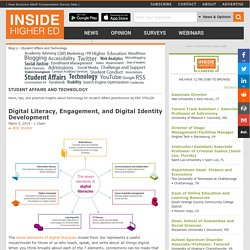
When you think broadly about each of the 7 elements, connections can be made that resonate with student affairs work. The section on communications and collaboration is especially relevant for those of us who work to enhance student engagement and create opportunities for digital community. The career and identity management element matches up perfectly to the concept of digital identity. When students transition into higher education it is often the case that their digital identity will also be in a state of transition.
Career services and orientation programs are in the perfect spot for providing educational efforts on digital identity. Information and communication technology (ICT) is perhaps the largest element in the model in terms of overall evolution and flux. Steady Online Learning Growth in HigherEd, Faculty Clueless on OER. After years of support from Sloan, the annual survey of higher education was sponsored this year by Pearson and conducted by Babson Survey Research Group.
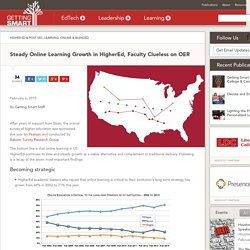
The bottom line is that online learning in US HigherEd continues its slow and steady growth as a viable alternative and complement to traditional delivery. Following is a recap of the seven most important findings. Becoming strategic. Supporting a MOOC. MOOCs in 2014: Breaking Down the Numbers. EdSurge Newsletters Receive weekly emails on edtech products, companies, and events that matter.
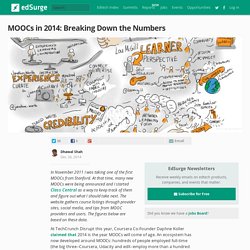
In November 2011 I was taking one of the first MOOCs from Stanford. At that time, many new MOOCs were being announced and I started Class Central as a way to keep track of them and figure out what I should take next. The website gathers course listings through provider sites, social media, and tips from MOOC providers and users. The figures below are based on these data. At TechCrunch Disrupt this year, Coursera Co-Founder Daphne Koller claimed that 2014 is the year MOOCs will come of age.
This year, the number of universities offering MOOCs has doubled to cross 400 universities, with a doubling of the number of cumulative courses offered, to 2400. 22 of the top 25 US universities in US News World Report rankings are now offering courses online for free. Providers In 2013, Coursera offered nearly half of all MOOCs, but in 2014 its share has shrunk to a third. MiriadaX became the first non-U.S. Microsoft Word - HRK_Positionspapier zu MOOCs 24042014.doc - HRK_Positionspapier_zu_MOOCs_24042014_02.pdf.
2014-nmc-horizon-report-he-EN-SC.pdf. 2014-nmc-horizon-report-he-EN-SC.pdf. 2014-nmc-horizon-report-library-EN.pdf. MOOCs: emerging research - Distance Education - Volume 35, Issue 2. Few phenomena in recent memory have rocked the boat of higher education generally, and the field of distance education in particular, more than the advent of massive open online courses (MOOCs).
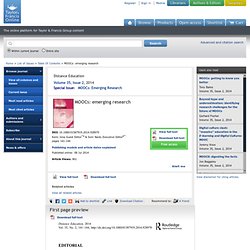
Supporters of these online courses, which are aimed at unlimited participation and open access via the Web, hail it as a true, disruptive innovation (Christensen, 20136. Christensen, C. (2013). The innovator’s dilemma: When new technologies cause great firms to fail. Boston, MA: Harvard Business Review Press. View all references), as well as a means of democratizing access to education and as promising new insights on teaching and learning from analytics on tens of thousands to millions of students (e.g. View all references; Siemens & Long, 201113. View all references). Some MOOCs are designed to enable anyone anywhere to study free university courses or pursue their interests by taking taster courses.
There are three solicited commentaries and six feature articles in this issue. Special edition on research on MOOCs in the journal ‘Distance Education’ The maturing of the MOOC: literature review of massive open online courses and other forms of online distance learning - 13-1173-maturing-of-the-mooc.pdf. MOOC completion rates. Problems with MOOC research. May 29, 2014 by jennymackness Like Frances Bell and Roy Williams, I too have listened to Stephen Downes’ recent presentation to a German audience in Tubingen, Germany.
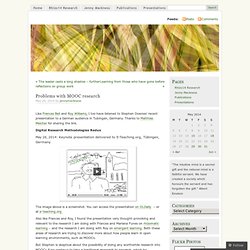
Thanks to Matthias Melcher for sharing the link. Digital Research Methodologies Redux May 26, 2014: Keynote presentation delivered to E-Teaching.org, Tübingen, Germany The image above is a screenshot. Also like Frances and Roy, I found the presentation very thought-provoking and relevant to the research I am doing with Frances and Mariana Funes on rhizomatic learning – and the research I am doing with Roy on emergent learning. But Stephen is skeptical about the possibility of doing any worthwhile research into MOOCs if we continue to take a traditional approach to research, which he describes in this slide:
Newsfeed von Sabine Siemsen. What is the difference between a MOOC and the e-learning courses of the last years? In the last “ZML-Leseclub” Gudrun, Erika and I had a vivid discussion about MOOCs.
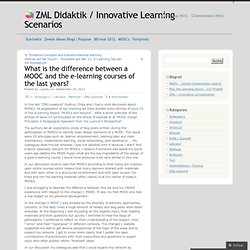
As preparation of our meeting we have studied some articles of issue 33 of the eLearning Papers “MOOCs and beyond”. After a short overview of the articles of issue 33 we focussed on the article of Gùardia et al “MOOC Design Principles. A Pedagogical Approach from the Learner’s Perspective“. The authors did an exploratory study of blog posts written during the participation in MOOCs to identify main design elements of a MOOC. The result were 10 principles such as: learner empowerment, learning plan and clear orientations, collaborative learning, social networking, peer assistance, … My colleagues liked this list whereas I was not satisfied with it because I didn’t find a factor especially relevant for MOOCs.
I was struggling to describe the difference between this list and my cMOOC experience with respect to the change11 MOOC. A Review on Massive E-Learning (MOOC) Design, Delivery and Assessment - A-review-on-massive-elearning-using-agents.pdf. MOOCs: A systematic study of the published literature 2008-2012. Abstract Massive open online courses (MOOCs) are a recent addition to the range of online learning options.
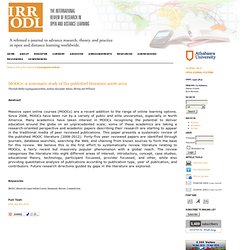
Since 2008, MOOCs have been run by a variety of public and elite universities, especially in North America. Many academics have taken interest in MOOCs recognising the potential to deliver education around the globe on an unprecedented scale; some of these academics are taking a research-oriented perspective and academic papers describing their research are starting to appear in the traditional media of peer reviewed publications. This paper presents a systematic review of the published MOOC literature (2008-2012): Forty-five peer reviewed papers are identified through journals, database searches, searching the Web, and chaining from known sources to form the base for this review.
We believe this is the first effort to systematically review literature relating to MOOCs, a fairly recent but massively popular phenomenon with a global reach. Keywords. Microsoft Word - 098-chen-en_ver2.docx - 098-chen-en. Social Media Research. MOOC Research Evidence. MOOC Research. Fachportal Pädagogik - pedocs - pedocs - Detailanzeige. The maturing of the MOOC: literature review of massive open online courses and other forms of online distance learning - 13-1173-maturing-of-the-mooc.pdf.
MOOCs and online learning: Research roundup. The potential of MOOCs — massive open online courses — to provide educational access to all has generated significant interest and no shortage of hype.
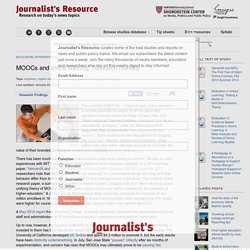
New York Times columnist Thomas Friedman described them as an educational “revolution,” while the Washington Post suggested they could provide “elite education for the masses.” Some businesses see the potential for bridging the “skills gap” between workers and employers, while universities view online offerings as a way to maximize the value of their branded pedagogical content and potentially shore up revenue. There has been much theorizing, but real empirical evidence is starting to come in. Studies on early experiences with MIT’s and Harvard’s EdX platforms have now been released. A May 2014 report from Teachers College, Columbia University, examines the experiences of faculty, staff and administrators at 82 institutions to assess “expectations and realities” nationwide. MOOCs and online learning: Research roundup Journalist.
Passive MOOC Students Don’t Retain New Knowledge, Study Finds – Wired Campus. Students in massive open online courses are apt to take a passive approach to learning, avoiding collaboration with others, seeking only passing grades, and therefore not retaining new knowledge, a new study has found.
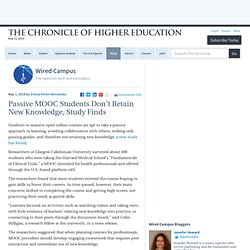
Researchers at Glasgow Caledonian University surveyed about 400 students who were taking the Harvard Medical School’s “Fundamentals of Clinical Trials,” a MOOC intended for health professionals and offered through the U.S. -based platform edX. The researchers found that most students entered the course hoping to gain skills to boost their careers. As time passed, however, their main concerns shifted to completing the course and getting high scores, not practicing their newly acquired skills. “Learners focused on activities such as watching videos and taking tests, with little evidence of learners’ relating new knowledge into practice, or connecting to their peers through the discussion board,” said Colin Milligan, a research fellow at the university, in a news release. Survey releveals the training potential of MOOCs for web skills. Methodology The present online survey was carried out with the aim of providing insights and data to help strengthen and enhance the use of MOOCs for web talent across Europe.
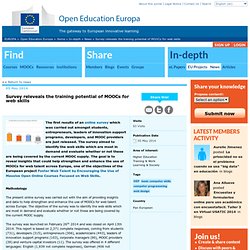
The objective of the survey was to identify the web skills which are most in demand and evaluate whether or not these are being covered by the current MOOC supply. The survey was launched on February 26th 2014 and was closed on April 13th 2014. This report is based on 2,371 complete responses, coming from students (731), developers (315), entrepreneurs (306), academicians (443), leaders of innovation support programs (103), corporate managers (90), MOOC providers (39) and venture capital investors (11).